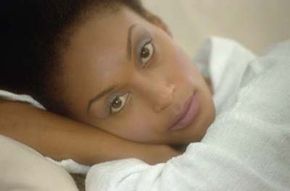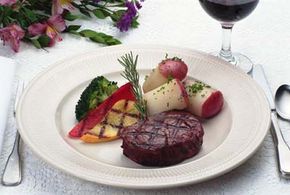When you are having menstrual problems, you don't feel like going anywhere. Luckily, there are plenty of home remedies right in your very own kitchen that will get you back on the road to feeling great.
Home Remedies from the Cupboard
Buckwheat. It's high in bioflavonoids and can reduce heavy bleeding when taken with vitamin C. Try it in buckwheat pancakes. Fruits, nuts, and seeds are high in bioflavonoids, too.
Home Remdies from the Refrigerator
Citrus fruits. Eat or drink with your meals to enhance iron absorption into the body, since iron is easily depleted during menstruation.
Dried apricots. These are high in iron, which is important during menstruation because iron supplies can be depleted with heavy bleeding. Other iron-rich foods are: liver, legumes, shellfish, and fortified breads and cereals.
Red meat. It's loaded with iron as well as zinc, which can be depleted during menses, too. Zinc is necessary for healthy bones, and a zinc deficiency may result in amenorrhea. Other iron- and zinc-rich foods: poultry, fish, green leafy vegetables.
Home Remedies from the Sink
Hot water. Put it in a hot water bottle and place on the abdomen to relieve cramps. Or, soak a kitchen towel, then wring out excess water, heat in microwave for a minute, and place on abdomen. Be careful not to burn yourself.
Water. Drink plenty of it. Dehydration can cause the body to produce a hormone called vasopressin that contributes to cramps.
Home Remedies from the Spice Rack
Basil. This can relieve some of the normal pain associated with menstruation because it contains caffeic acid, which has an analgesic, or pain-killing, effect. Thyme is also high in caffeic acid. Use it as a spice in cooking meat and vegetables or Italian dishes. Or steep the herb into tea, adding 2 tablespoons thyme or basil leaves to 1 pint boiling water. Cover tightly and let cool to room temperature. Drink 1/2 to 1 cup an hour for painful menstruation.
Cinnamon. This has anti-inflammatory and antispasmodic properties that relieve cramps. Use as a tea, or sprinkle on toast or sweet rolls. If you have a heavy period, drinking cinnamon tea the day before or during your period may help.
Fennel. Another cramp cure, this spice promotes better circulation to the ovaries. Crush 1 teaspoon fennel seeds into a powder. Add to 1 cup boiling water, steep five minutes, strain, and drink hot.
Ginger. This is a cramp reliever, and as an added bonus it sometimes can make irregular periods regular. Use in cookies, cake, and candy or as a spice in vegetables and stir-fries. Tea may be the most effective form, however: put 1/2 teaspoon in 1 cup boiling water, and drink three times a day.
Mint. Either peppermint or wintergreen can relieve cramps. Steep into a tea and drink a cup or two a day. Try sucking on mint candy, too.
Mustard. A tablespoon or two of powdered mustard in a basin of nice warm water can relieve cramps, but don't drink it. Soak your feet in it to reap the relaxing effects.
Home Remedies from the Supplement Shelf
Vitamin K. Women who have heavy periods may find relief by taking vitamin K supplements. This is the case even if the blood levels of the vitamin are within the normal range.
More Do's & Don'ts
More Do's & Don'ts
- Stay warm. Women who stay warm during their period are less prone to cramps.
- Exercise regularly. This increases circulation to the pelvic region and helps clear out prostaglandins. Regular exercise during the month can make that time of the month go easier.
- Try using sanitary pads. Tampons can cause cramping.
- Do the pelvic tilt to relieve cramps. Lie on your back with your knees bent and your feet flat. Tighten your abdominal muscles and your buttocks and raise your pelvis, angling it toward your head. Press your lower back to the floor, and hold the position for a few seconds. Gently lower your buttocks to the floor. Repeat several times.
- Lie on your back with your knees bent. This position can relieve cramps, too.
- Take a nice hot bath.
- Relax. Listen to soothing music. Read a good book. Invent a pleasant fantasy and stay there for awhile. Anxiety and stress can make cramps worse.
- Talk to your doctor about your birth control choices. IUDs cause cramps and excessive bleeding. And the Pill can relieve symptoms: It lessens cramps and flow, shortens the length of the period, and makes a menstrual period regular. But some conditions contraindicate the use of the Pill: liver disease, hypertension, diabetes, heart disease, stroke, varicose veins, and gallbladder disease. So have that chat with the doc.
Now that you've got a handle on all the great home remedies to ease the discomfort of menstrual problems, you're sure to feel better.
For more information on menstrual irregularities, try the following links:
ABOUT THE AUTHORS:
Linnea Lundgren has more than 12 years experience researching, writing, and editing for newspapers and magazines. She is the author of four books, including Living Well With Allergies.
Michele Price Mann is a freelance writer who has written for such publications as Weight Watchers and Southern Living magazines. Formerly assistant health and fitness editor at Cooking Light magazine, her professional passion is learning and writing about health.
ABOUT THE CONSULTANT:
David J. Hufford, Ph.D., is university professor and chair of the Medical Humanities Department at PennsylvaniaState University's College of Medicine. He also is a professor in the departments of Neural and Behavioral Sciences and Family and Community Medicine. Dr. Hufford serves on the editorial boards of several journals, including Alternative Therapies in Health & Medicine and Explore.
This information is solely for informational purposes. IT IS NOT INTENDED TO PROVIDE MEDICAL ADVICE. Neither the Editors of Consumer Guide (R), Publications International, Ltd., the author nor publisher take responsibility for any possible consequences from any treatment, procedure, exercise, dietary modification, action or application of medication which results from reading or following the information contained in this information. The publication of this information does not constitute the practice of medicine, and this information does not replace the advice of your physician or other health care provider. Before undertaking any course of treatment, the reader must seek the advice of their physician or other health care provider.

